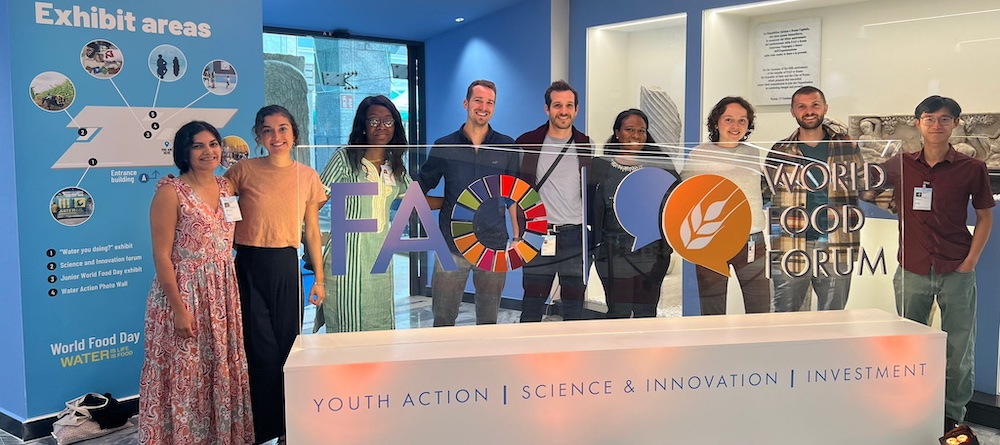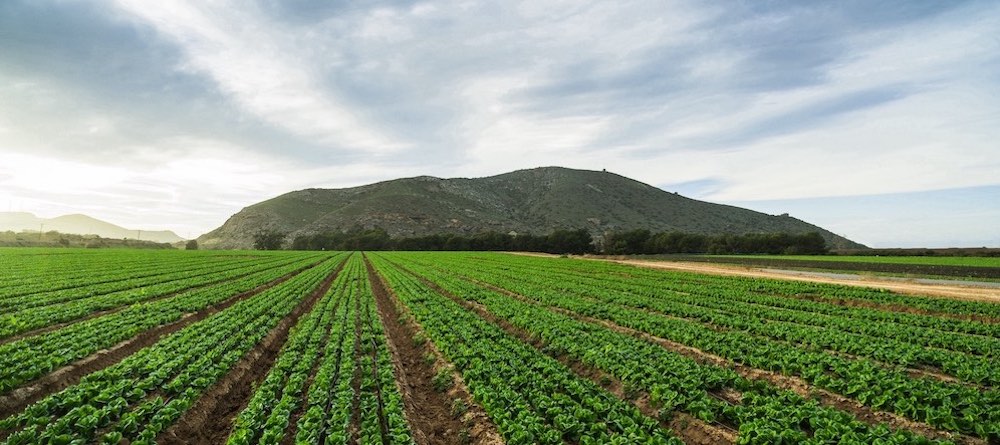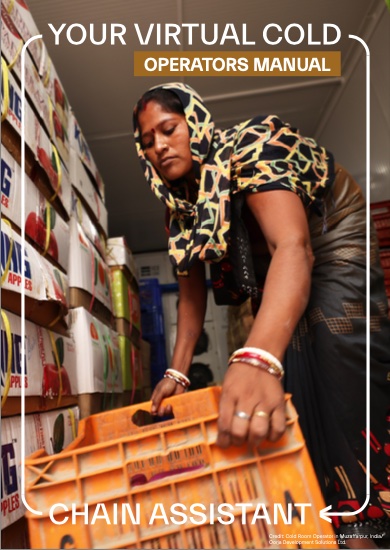|
|
|
|
|
|
|
| January 2024 |
Our newsletter is full of updates on our research, education and outreach activities. And we share member highlights and publications.
We hope these stories from researchers working on innovation and dialogue to transform our food system help to kindle some energy to keep striving for change in 2024. |
|
|
|
|
|
|
|
|
|
| Center News |
| Joining the Global Youth Forum |
 |
 |
A selected delegation of nine students and researchers represented ETH Zurich at the Global Youth Forum of the World Food Forum, held at the Food and Agriculture Organization of the United Nations (FAO) in Rome from 16-20 October. The theme of the forum was Agrifood systems transformation accelerates climate action.
The ETH Zurich Youth Delegation had the opportunity to interact and exchange with leaders and youth from around the globe about pressing issues that our local and global food systems face.
We are proud of these young students and researchers for sharing their ideas and passion about food systems transformation. And thanks to the Swiss Youth Delegation for meeting up to share the experience. |
|
|
|
|
|
|
|
|
| New Executive Office Staff |
Billie Maude Hauser started in the role of Research & Outreach Manager at the Center in November 2023. She oversees the coordination of many of the Center’s Research Programs. She also develops and implements outreach events to share and discuss research findings with practitioners, policymakers, and the wider public.
Please see the Executive Office page to learn more about our team. |
|
|
|
|
|
|
|
|
| New Members |
 Prof. Andrea Carminati leads the Physics of Soils and Terrestrial Ecosystems Group in the ETH Zurich Department of Environmental Systems Science. His group studies the mechanisms that confer drought tolerance to crops and allow them to grow under water-limited conditions. Their research provides fundamental insight into sustaining plant growth during drought. Prof. Andrea Carminati leads the Physics of Soils and Terrestrial Ecosystems Group in the ETH Zurich Department of Environmental Systems Science. His group studies the mechanisms that confer drought tolerance to crops and allow them to grow under water-limited conditions. Their research provides fundamental insight into sustaining plant growth during drought.
Visit the Group Website |  Prof. Gregory Velicer heads the Evolutionary Biology Group in the ETH Zurich Department of Environmental Systems Science. The group studies cooperation and conflict in bacteria that engage in social motility, aggregative multicellular development and predation. They also aim to reduce use of synthetic chemicals such as fungicides in agriculture by developing predatory bacteria as biocontrol agents. Prof. Gregory Velicer heads the Evolutionary Biology Group in the ETH Zurich Department of Environmental Systems Science. The group studies cooperation and conflict in bacteria that engage in social motility, aggregative multicellular development and predation. They also aim to reduce use of synthetic chemicals such as fungicides in agriculture by developing predatory bacteria as biocontrol agents.
Visit the Group Website |
|
|
|
|
|
|
|
| Research |
| New Research for Sustainable Food Systems |
 |
 |
The Center's Research Programs support new cross-disciplinary and solution-oriented research to address food system challenges. We are pleased to announce many new projects funded through our Research Programs starting in 2024.
Three new projects supported by the Future Food Initiative focus on various topics of health and nutrition. Adipose tissue expandability and probiotic bacteria functional ability will be investigated as well as new innovations for processing plant proteins. |
|
|
| New ways to measure nitrous oxide emissions from soils as well as detect invasive pests in vineyards are the foci of two new interdisciplinary projects starting in 2024. Both projects are funded by the Center’s Smart Sustainable Farming Research Program |
|
|
The Center also announced two new projects starting in 2024 focused on understanding how different crop rotation practices affect water and nitrogen balances as well as production. Both projects are funded by the Improving Sustainability of Agricultural and Food Systems across Key Environmental Metrics Research Program.
|
|
|
|
|
|
|
|
|
|
|
| Flagship Project Enhancing Resilience in Food Systems |
| The RUNRES (Rural-Urban Nexus: Establishing a nutrient loop to improve city-region food system Resilience) team has successfully entered a second phase of the project. From 2023-2027, the team will focus on scaling up the successful innovations in four countries, Ethiopia, Rwanda, South Africa and the Democratic Republic of the Congo. They will use three pathways: established private-public partnerships (PPPs) will continue and enlarge their activities; new PPPs will be initiated; and the project team will support other initiatives. |
|
|
|
|
|
|
|
|
|
| Flagship Project Novel Proteins for Food and Feed |
| One of the innovation areas of the Novel Proteins for Food and Feed Flagship Project focuses on processes to enable microalgae derived proteins for food applications. Many developments occurred in the last months, including that researchers at National University of Singapore, part of the Urban Microalgae Protein Production project team at Singapore-ETH Centre (SEC), have created calamari rings using microalgae and mung bean protein. In addition, a new study from the Consumer Behavior Group at ETH Zurich investigated the acceptance of microalgae-based food products. The findings of a survey of nearly 600 consumers in Singapore suggests that a microalgae-based meat/fish substitute appears to align with consumer expectations. Also, the first SEC x Wageningen Science Symposium was held. |
|
|
|
|
|
|
|
|
|
|
|
|
| Education |
| Alumni Stories: Breathing new life into an ancient crop |
| Future Food Fellow and Center alumni Joan Oñate Narciso shares how her work on kabog millet with communities in Cebu, Phillipines has left a lasting impression. She started projects to provide shelf-life training to kabog millet farmers in Cebu and also tested the usefulness of hermetic bags for grain storage. She mentions; "If there are lessons I learned in the past three years when the kabog millet was the center of my life, it would be humility, passion, persistence, people, prayer – perhaps almost all farmers and those who are tied to the land would have possessed these qualities in one way or another." |
|
|
|
|
|
|
|
|
|
| Beans to Bars |
The Center educational game ‘From Beans to Bars’ was presented at the CAS ‘Sustainable Food’ at the Bern University of Applied Sciences last fall. The various participants, including dieticians, food engineers, and hotel managers, learned about the differents steps of the cocoa value chain and the stakeholders involved, with the help of the role-play board game. One participant shared after; "this helped me to understand the complexity of the food system and the numerous interdependencies. It takes courage (and a budget!) to innovate towards a more sustainable food system."
And teachers from across Switzerland, interested in bringing the theme of sustainable food systems into the classroom, will take part this weekend in the Center's workshop 'Bittersweet Stories of Chocolate.' The workshop is part of the program of Continuing Education for Teachers at the University of Zurich. |
|
|
|
|
|
|
|
|
|
|
| Outreach |
| Food Day @ETH 2023 |
Food Day @ETH took place again last November and brought over 200 people with different backgrounds together and led to lively discussions on food system transformation. After workshops focusing on the topics of grassland use, nutrition, and science policy, the plenary session focused on engaging youth in food systems transformation. The networking poster session gave young scientists a stage to present their innovative research on food system related topics.
Thanks to all that joined us, and congrats to the Poster Prize winners! |
|
|
|
|
|
|
|
|
|
| Outreach |
| Olma and Scientifica |
Olma took place in St. Gallen in October, and ETH Zurich was present to share ideas for the Future of Food and Agriculture. Visitors could experience how ETH research in various disciplines is helping to secure a more sustainable food system. Innovative research from several Center member groups was presented. Seeing the microalgae bioreactor and Leaf Growth Tracker in action were highlights.
In September, the Department of Enviornmental Systems Science and the Center had a collaborative booth at Scientifica, the public science event of ETH Zurich and the University of Zurich. Many researchers shared their work on innovations for sustainable food systems. |
|
|
|
|
|
|
|
|
|
|
| Member Highlights |
 The Operators Manual for Your Virtual Cold Chain Assistant was released. This comprehensive and accessible guide that consolidates essential information for maintaining top-quality food standards is a joint project by the Empa (Thijs Defraeye), Base Foundation and others. The Operators Manual for Your Virtual Cold Chain Assistant was released. This comprehensive and accessible guide that consolidates essential information for maintaining top-quality food standards is a joint project by the Empa (Thijs Defraeye), Base Foundation and others.
Nina Buchmann, Alexander Mathys and many other Center members contributed to the Open Your Eyes Photo Festival in Zurich in October 2023.
Johan Six presented in Milan a keynote address at the Biostimulants World Congress entitled 'Resilient food systems under global change in Sub-Saharan Africa.'
Nina Buchmann contributed to the ETH Klimarunde 2023 'Klimawandel: Vom Wissen zum Handeln' and joined the talks on 'Landwirtschaft im Klimawandel?'
In November, Johan Six was appointed to the International Scientific Advisory Board of the Institute of Agrifood Research and Technology in Catalonia, Spain.
Exciting interdisciplinary projects
Anna Fabry and Patrick Illien will start an ETH4D Pilot grant to undertake a photovoice project on informal work in urban food systems in Ghana.
The 3rd General Assembly of the MICROSERVICES project took place in December at ETH Zurich. Partners from University of Barcelona, LEITAT Technological Center, INRAE, University of Kassel, Agroscope, the European Landowners’ Organization, and the Sustainable Agroecosystems Group at ETH Zurich participated in a vibrant meeting and discussed the various results coming out of this project.
Awards and Distinctions
Samuel Levy and team (ETH Zürich) received the Swiss Forum for International Agricultural Research (SFIAR) Team Award 2023 for their project 'The effectiveness of corporate zero-deforestation commitments at reducing agricultural deforestation in Brazil.'
Lorenz Allemann received the Swiss Forum for International Agricultural Research (SFIAR) Master's Thesis Award 2023 for his thesis entitled, 'Nitrogen sources of Brachiaria spp. in tropical pastures.' The work was conducted in the Plant Nutrition Group at ETH Zurich.
In the News
A team led by researchers from ETH Zurich and the Swiss Federal Institute for Forest, Snow and Landscape Research (WSL) advances to the finals of the competition XPRIZE Rainforest: Using drones to monitor rainforest biodiversity
Results from a global team of researchers, including many from group of Tom Crowther highlighted in ETH News in August: Biodiversity protects against invasions of non-native tree species
ETH spin-off Gaia Tech from the Food Biochemistry Group profiled in ETH News in August: Valuable raw materials from olive waste
Research of Julie Lestang, from the member group of Food Biochemistry, featured in ETH News in September: Cacao “fingerprints” for better chocolate
Research from group of Johan Six featured in ETH News in October: ETH Zurich researchers study one of the world’s darkest rivers
|
|
|
|
|
|
|
| Food Systems Publications |
| Recent publications from WFSC members that highlight their work on food system topics. |
| • | | Highlight on Sustainable Livelihoods
Fabry, A. et al. Decent and equal work in agri-food systems: Evidence from Peru. https://doi.org/10.1002/aepp.13415
Illien, P., et al. (2023) Bittersweet fruits of “Miracle Growth”: Identifying poverty and labour dynamics in coffee heartlands (Policy Brief). https://doi.org/10.3929/ethz-b-000619216
Jacobi, J., et al. (2023) Making specialty coffee and coffee-cherry value chains work for family farmers’ livelihoods: A participatory action research approach. https://doi.org/10.1016/j.wdp.2023.100551
|
| • | | Highlight on Sustainable Animal Nutrition and Welfare
Lentsch, V. et al. "EvoVax" - A rationally designed inactivated Salmonella Typhimurium vaccine induces strong and long-lasting immune responses in pigs. https://doi.org/10.1016/j.vaccine.2023.07.059
Niu, P., et al. (2023) Effects of graded levels of dietary pomegranate peel on methane and nitrogen losses, and metabolic and health indicators in dairy cows. https://doi.org/10.3168/jds.2022-23141
Heuel, M., et al. (2023) Low transfer of cadmium, lead and aflatoxin B1 to eggs and meat of laying hens receiving diets with black soldier fly larvae reared on contaminated substrates. https://doi.org/10.1016/j.anifeedsci.2023.115733
|
| • | | Defraeye T., et al. (2023) Passive evaporative coolers for postharvest storage of fruit and vegetables: Where to best deploy them and how well do they perform. https://doi.org/10.3389/frfst.2023.1100181 |
| • | | Ewert, F., et al. (2023). Agroecology for a sustainable agriculture and food system – from local solutions to large-scale adoption. https://doi.org/10.1146/annurev-resource-102422-090105 |
| • | | Feigenwinter, I., et al. (2023) N2O and CH4 fluxes from intensively managed grassland: The importance of biological and environmental drivers vs. management. https://doi.org/10.1016/j.scitotenv.2023.166389 |
| • | | Finger, R. (2023). Digital innovations for sustainable and resilient agricultural systems. https://doi.org/10.1093/erae/jbad021 |
| • | | Finger, R., et al. (2023). Glyphosate ban will have economic impacts on European agriculture but effects are heterogenous and uncertain. https://doi.org/10.1038/s43247-023-00951-x |
| • | | Green, A, et al. (2023) A proposed framework to develop nutrient profiling algorithms for assessments of sustainable food: the metrics and their assumptions matter. https://doi.org/10.1007/s11367-023-02210-9 |
| • | | Kapp-Bitter, A.N., et al. (2023) Effects of dietary Sanguisorba minor, Plantago lanceolata, and Lotus corniculatus on urinary N excretion of dairy cows. https://doi.org/10.1071/AN22300 |
| • | | Keller, B. et al. (2023) Linking photosynthesis and yield reveals a strategy to improve light use efficiency in a climbing bean breeding population. https://doi.org/10.1093/jxb/erad416 |
| • | | Klaus V.H., et al. (2023) Additive effects of two agri-environmental schemes on plant diversity but not on productivity indicators in permanent grasslands in Switzerland. https://doi.org/10.1016/j.jenvman.2023.119416 |
| • | | Kreft, C., et al. (2023). Quantifying the impact of farmers’ social networks on the effectiveness of climate change mitigation policies in agriculture. https://doi.org/10.1111/1477-9552.12557 |
| • | | Li, S., et al. (2023) Dietary habits of pastoralists on the Tibetan plateau are influenced by remoteness and economic status. https://doi.org/10.1016/j.foodres.2023.113627 |
| • | | Liu, X., et al. (2023) Soil (microbial) disturbance affect the zinc isotope biogeochemistry but has little effect on plant zinc uptake. https://doi.org/10.1016/j.scitotenv.2023.162490 |
| • | | Matthys, M.-L., et al. (2023) The role of high-value agriculture in capability expansion: Qualitative insights into smallholder cash crop production in Nepal, Laos and Rwanda. https://doi.org/10.1057/s41287-023-00600-1 |
| • | | Minna, K. et al. (2023) Reflexive use of methods: a framework for navigating different types of knowledge and power in transformative research. https://doi.org/10.1007/s11625-023-01431-z |
| • | | Mouhrim , N. et al. Optimization models for sustainable insect production chains. https://doi.org/10.1163/23524588-20230148 |
| • | | Müller, S., et al. (2023) Response of dual-purpose and layer hybrid hens in yield and quality of eggs, carcass and meat to a diet composed of food industry by-products and grain legumes – a pilot study. https://doi.org/10.1399/eps.2023.389 |
| • | | Peguero, D. et al. (2023) Evaluation of ammonia pretreatment of four fibrous biowastes and its effect on black soldier fly larvae rearing performance. https://doi.org/10.1016/j.wasman.2023.01.033 |
| • | | Qin, S., et al. (2023) Biotechnologies for bulk production of microalgal biomass: from mass cultivation to dried biomass acquisition. https://doi.org/10.1186/s13068-023-02382-4 |
| • | | Rees, C., et al. (2023). National organic action plans and organic farmland area growth in Europe. https://doi.org/10.1016/j.foodpol.2023.102531 |
| • | | Sägesser, C. et al. (2023) A novel approach for the protein determination in food-relevant microalgae. https://doi.org/10.1016/j.biortech.2023.129849 |
| • | | Schudel S. et al. (2023) Solution roadmap to reduce food loss along your postharvest supply chain from farm to retail. https://doi.org/10.1016/j.fpsl.2023.101057 |
| • | | Siegrist, A., et al. (2023) Recent findings on environmental sustainability and conversion efficiency of waste-to-protein pathways. https://doi.org/10.1016/j.cogsc.2023.100833 |
| • | | Terranova, M., et al. (2023) Indications for a lower methane yield from digested fibre in ruminants digesting fibre more efficiently. https://doi.org/10.1016/j.anifeedsci.2023.115834 |
| • | | Torrico, G.G., et al. Socioeconomic and biophysical factors affect tree diversity in farms producing specialty coffee in Caranavi, Bolivia. https://doi.org/10.1007/s10457-023-00920-5 |
| • | | Villavicencia-Valdez, G.V.; et al. (2023) Urban agroecology enhances agrobiodiversity and resilient, biocultural food systems. The case of the semi-dryland and medium-sized Querétaro City, Mexico. https://doi.org/10.3389/fsufs.2023.1066428 |
| • | | Wang, Y., et al. (2023). Culture and agricultural biodiversity conservation. https://doi.org/10.1016/j.foodpol.2023.102482 |
| • | | Wittwer R.A., et al. (2023) Limited capability of organic farming and conservation tillage to enhance agroecosystem resilience to severe drought. https://doi.org/10.1016/j.agsy.2023.103721 |
| • | | Zachmann, L., et al. (2023). Nudging farmers towards low-pesticide practices: Evidence from a randomized experiment in viticulture. https://doi.org/10.1002/jaa2.76 |
| • | | Zehnder, T., et al. (2023) The effects of Alnus viridis encroachment in mountain pastures on the growth performance, carcass and meat quality of Dexter cattle and Engadine sheep. https://doi.org/10.1071/AN22409 |
|
|
|
|
|